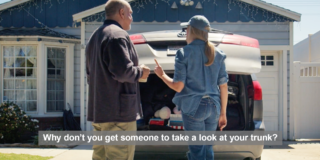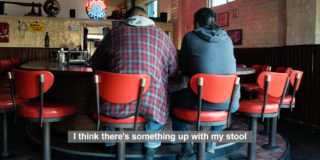
** UPDATE – We won! **
We just scooped an award from the The Creative Floor Healthcare Awards …for comedy.
That’s right, comedy. In healthcare. For a campaign about colorectal cancer screening.
We could’ve taken the safe, traditional healthcare advertising route. And ended up with safe, traditional results.
Instead, we leaned into humour. Because humour is human. And if we wanted people to talk about colorectal cancer, we had to make it easier to talk about. Not harder.
And that’s exactly what we did with this campaign.
Right, back to the blog –
Colorectal cancer is on the rise.
And like so many cancers, early detection can play a major role in improving patient outcomes. In response, the US lowered the screening age from 50 to 45 a few years ago. Yet despite this change, many weren’t getting screened.
“Raising awareness of the trend and the distinct symptoms of early-onset colorectal cancer among young people and primary care providers can help reduce delays in diagnosis and decrease mortality.”
– Hyuna Sung, Senior Researcher, American Cancer Society
Stigma – a real pain in the rear
In 2024, our creative team was asked by a Leading Medical Device Manufacturer to create a campaign encouraging younger American citizens to get screened for colorectal cancer.
But tackling such a sensitive topic comes with its challenges. How do you address a subject that people often avoid discussing, not just out of discomfort, but due to deeply ingrained societal taboos? The campaign needed to acknowledge and confront this stigma, break down barriers, and foster open, honest conversations about colorectal cancer screening.
When it comes to healthcare, it’s always important to keep in mind that patients are, first and foremost, normal everyday people. So, our strategy was to use humour to make the topic less intimidating. To help break the stigma associated with the condition, it needed to reflect real people doing ordinary things in ordinary places.
A cheeky solution
We focused on one simple human truth—no one talks about colorectal cancer. So, we created a campaign where no one talks about colorectal cancer. The films are simple and to the point. Each one relies on a single euphemism to talk about colorectal cancer without having to talk about colorectal cancer.
Always framed with two people, always facing deliberately away from the camera, relatively quick to make, (allowing for many more to be created), and ideal for executing across multiple channels.
This approach made the conversation around colorectal cancer screening more approachable. It encouraged people to see it as a simple and routine process. The scripts were also written so messaging could be adapted to create versions highlighting hereditary risks and the new lowered screening age –
“Colorectal cancer. Hard to talk about. Easy to screen for.”





